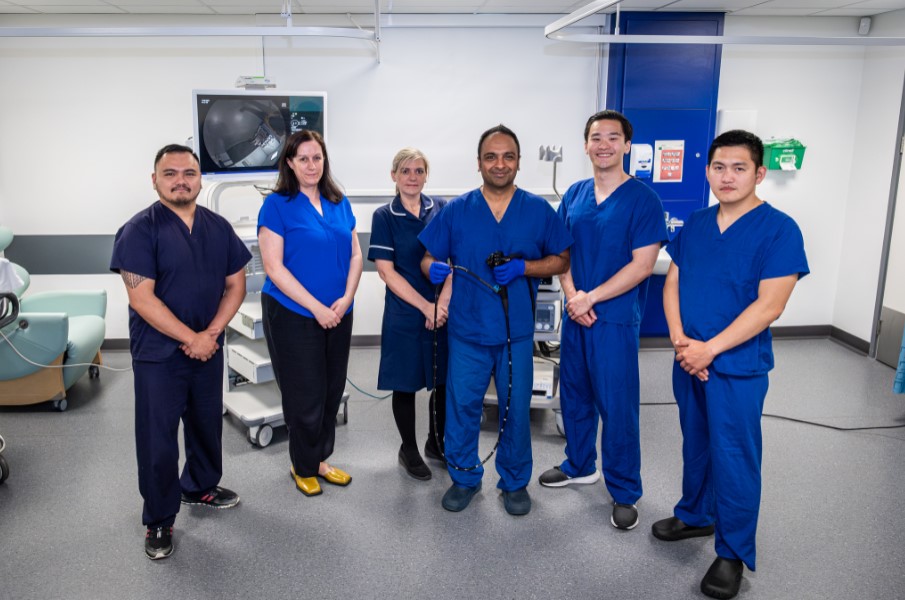Published on: 7 July 2025
A team has carried out the first operation of its kind in our region as they helped a patient undergo a procedure which aims to keep them well and prevent bowel cancer.
The treatment took place in the theatre at South Tyneside District Hospital, which is a designated national small bowel training centre.
It saw a bowel endoscopy procedure, in this case a double balloon enteroscopy (DBE), carried out in conjunction with keyhole surgery. This is an operation which has only taken place out a small number of times in a handful of locations across the UK.
An Endoscopy is a medical procedure where a thin, flexible tube with a camera, called an endoscope, is inserted into the body to show the internal organs and structures.

Redwin Evangelista, Deputy Manager of the South Tyneside District Hospital Endoscopy Unit, Zoe Clapham, Clinical and Operational Lead, Jemma Archbold Endoscopy Unit Manager, Dr Amit Chattree, Consultant Gastroenterologist, Er Winn Lim, Trust Doctor, and Don Emerson Pasco, Endoscopy Staff Nurse.
In this case it was rare because the DBE was done in combination with keyhole surgery. Carrying it out at the hospital, which is run by South Tyneside and Sunderland NHS Foundation Trust, meant the patient did not have to travel to London for their surgery.
They have a genetic syndrome called Peutz Jaeger Syndrome. It causes multiple large growths, known as polyps, to grow in the lining of the bowel.
These can turn cancerous and frequently cause bowel blockages, so they need to be taken out.
The case was carried out by Consultant Gastroenterologist Dr Amit Chattree, Consultant Gastroenterologist surgeon Mr Shlok Balupuri, Consultant Anaesthetist Dr Darshen Boregowda, and endoscopy nurses Redwin Evangelista and Don Emerson Pasco.
Dr Chattree said:
"The polyp removed in this patient was so large that it could not be removed with normal small bowel endoscopy safely. This was because there was a risk of causing a bowel tear and that can be life-threatening.
"This is why we combined it with a surgical procedure using keyhole surgery. It allowed us easier access to the polyp and for it to be removed safely without any risk of complication.
"It also meant we didn’t have to remove a section of the small bowel or cut into the small bowel. This could have resulted in complications and a long recovery period.
"This patient was able to go home without any issues the next day, which is great news for them. Because this hospital is close to home, they did not have to face any extra travel while they were recovering.
"This is a great achievement as the procedure undertaken is very complex and is only performed in very small numbers in a handful of centres in the UK. I am very proud of the team."
Dr Chattree added that carrying out a DBE means diagnosis and treatments can be made which previously would not have been possible. They also mean that people do not need surgery as they used to before the technology was brought into use.
Dr Sean Fenwick is Director of Operations at the Trust.
He said:
"It is outstanding news we have not only carried out this operation for the first time here in the North East, but have been able to do it closer to home for this patient. That will have made their experience and recovery all the better.
"This and the work of our Endoscopy teams is one of many areas of work which makes the care we offer stand out not just regionally, but nationally. It’s also just one example of how we are leading across lots of different areas and have the expertise to carry out specialist treatment to care of our patients."
Last year, the Endoscopy Units at South Tyneside and Sunderland NHS Foundation Trust (STSFT) were hailed as being exemplar in their field.
The departments at South Tyneside District Hospital and Sunderland Royal Hospital were inspected by the Royal College of Physicians. Its Joint Advisory Group (JAG) on GI Endoscopy said the service operates to an exceptional standard.
The results of the inspection led to them being highlighted as having some of the best standards seen in the UK.
Between them, the hospitals carry out more than 10,000 procedures each year.
For more information about the Endoscopy care offered by STSFT visit this page: Endoscopy services
Further details about the Royal College of Physicians can be found here: Service praised for putting patients at the centre of care as inspectors hail its leaders and teamwork as among the best in the UK







